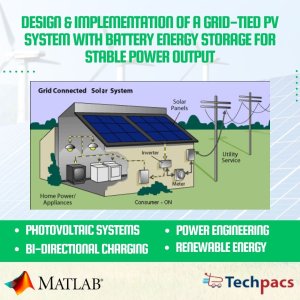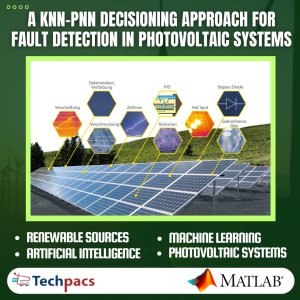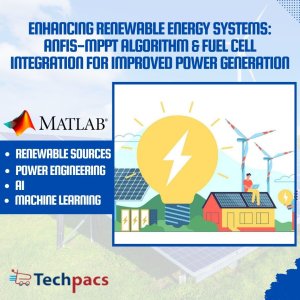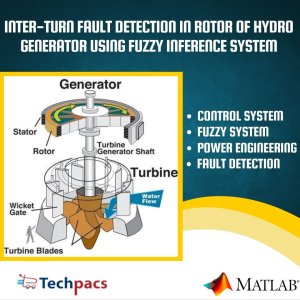Hybrid ANFIS-PID Controller for Solar PV System and EV Load Optimization
Problem Definition
By analyzing the information provided in the reference problem definition, it is evident that the use of Maximum Power Point Tracking (MPPT) technology is essential for enhancing the performance of photovoltaic systems. The MPPT controller plays a crucial role in extracting the maximum power output from PV modules based on factors such as temperature and solar irradiance. While various algorithms have been developed for efficient MPP tracking, the existing literature highlights the drawbacks of using a Proportional-Integral (PI) controller in conjunction with the ANFIS MPPT algorithm. The PI controller is associated with time-consuming stabilization, oscillations leading to the need for extreme stabilization measures, and prolonged settling and arising times, ultimately resulting in degraded system performance. These limitations underscore the need for a more effective and efficient approach to MPPT control in PV systems to overcome these challenges and improve overall system performance.
Objective
The objective is to address the limitations of the traditional PI controller in the ANFIS MPPT approach by implementing a PID controller. This hybrid MPPT technique aims to improve system response time, reduce oscillations, and enhance system stability. By applying this technique to extract maximum power from solar panels, specifically targeting a PMDC motor solar pump and an electric vehicle (EV) load, the overall efficiency of the system is expected to be enhanced. The integration of the ANFIS model with the PID controller will optimize the performance of the system, meeting the energy demands of both the PMDC motor solar pump and the EV load to achieve improved energy conservation and power extraction capabilities.
Proposed Work
The proposed work aims to address the limitations of the traditional PI controller in the ANFIS MPPT approach by implementing a PID controller instead. By incorporating the PID controller, the system is expected to have faster response, reduced oscillations, and improved stability. This hybrid MPPT technique will be applied to extract maximum power from solar panels, specifically targeting a PMDC motor solar pump as the load. The ANFIS-PID MPPT technique will be utilized to precisely determine the maximum power point of the PV array, enhancing the overall efficiency of the system. Additionally, the proposed approach will extend its application to an electric vehicle (EV) load, focusing on energy conservation requirements.
By supplying the appropriate dc voltage and current to the EV battery through a DC EV charging station, the system will be able to conserve more energy effectively.
To achieve the ANFIS model, fuzzy membership functions will be generated to act as inputs to the fuzzy model. The proposed model will use a Sugeno fuzzy model for ANFIS, creating two membership functions for error and change in error with a total of 49 fuzzy rules. These fuzzy rules will encompass all possible scenarios to optimize the performance of the system. By integrating the ANFIS model with the PID controller, the DC pump will be operated efficiently to meet the energy demands of both the PMDC motor solar pump and the EV load.
Through this comprehensive approach, the project aims to enhance the overall performance and effectiveness of the photovoltaic system, leading to improved energy conservation and power extraction capabilities.
Application Area for Industry
This project can be applied in various industrial sectors such as renewable energy, agriculture, and transportation. The proposed ANFIS-PID MPPT approach can significantly improve the performance of photovoltaic systems by efficiently tracking the maximum power point. By implementing PID controller instead of PI controller, the system benefits from rapid response to changes, reduction in oscillations, and overall improved stability. In the case of electric vehicles, the project helps in conserving energy by effectively supplying DC voltage and current to the vehicle battery through an EV charging station. Overall, the project addresses specific challenges faced by industries in maximizing energy efficiency and system performance, ultimately leading to cost savings and improved productivity across different domains.
Application Area for Academics
The proposed project can significantly enrich academic research, education, and training within the field of solar energy systems and control engineering. By implementing the ANFIS-PID MPPT technique for maximizing the power output of photovoltaic systems, researchers, students, and scholars can explore innovative research methods and simulations to enhance the performance of renewable energy systems.
This project is particularly relevant for researchers in the field of renewable energy, control systems, and electric vehicles. By utilizing the ANFIS algorithm with a PID controller, the project addresses the limitations of the traditional PI controller and offers faster response times, reduced oscillations, and improved system performance. This can be a valuable resource for MTech students and PhD scholars working on advanced control algorithms for renewable energy systems.
Furthermore, the application of the proposed approach in electric vehicle charging stations demonstrates the potential for energy conservation and efficiency in transportation systems. By integrating fuzzy logic and PID control in the ANFIS model, researchers can explore new methods for managing energy flow and optimizing charging processes for electric vehicles.
Overall, the project's innovative approach to MPPT and energy conservation in solar and electric vehicle systems offers a valuable resource for academic research, education, and training in the fields of renewable energy, control engineering, and sustainable transportation. The code and literature generated from this project can serve as a foundation for future research and applications in the development of smart energy systems and sustainable technology solutions.
Algorithms Used
The proposed approach in the project involves using the ANFIS-PID MPPT technique to find the maximum power point of a PV array, with the load being a PMDC motor solar pump. The PID controller is implemented to provide rapid response to changes in controller input and reduce oscillations. This approach is aimed at improving the efficiency of the MPPT process.
Furthermore, the project also focuses on another load, an electric vehicle (EV), to meet energy conservation demands. A DC EV charging station is used to supply DC voltage and current to the vehicle battery while controlling VCCF.
This helps in conserving energy and meeting the energy needs of the EV.
To achieve the ANFIS model, fuzzy membership functions are generated as inputs to the fuzzy model. The proposed model utilizes a Sugeno fuzzy model for ANFIS, with two membership functions (error and change in error) and 49 fuzzy rules. The combination of ANFIS and PID controller is implemented to control the DC pump efficiently and effectively.
Keywords
MPPT, maximum power point tracker, photovoltaic system, MPP tracking technology, Max Power Point Tracking controller, PV modules, solar irradiance, ANFIS MPPT algorithm, PI controller, PID controller, proportional controller, integral overshoot, settling time, arising time, system performance, PID controller, PMDC motor solar pump, electric vehicle, EV, DC charging station, VCCF, energy conservation, ANFIS model, Fuzzy memberships functions, Sugeno fuzzy model, error, change in error, fuzzy rules, intelligent techniques, power optimization, control algorithms, machine learning, artificial intelligence, data analysis, power generation.
SEO Tags
solar PV systems, power tracking, intelligent techniques, maximum power point tracking, MPPT algorithm, ANFIS MPPT, PID controller, PV array, PMDC motor, electric vehicle, EV charging station, energy conservation, fuzzy model, Sugeno fuzzy model, fuzzy rules, DC pump, renewable energy, performance optimization, control algorithms, machine learning, artificial intelligence, data analysis, power generation, energy efficiency
| Shipping Cost |
|
No reviews found!

















































No comments found for this product. Be the first to comment!